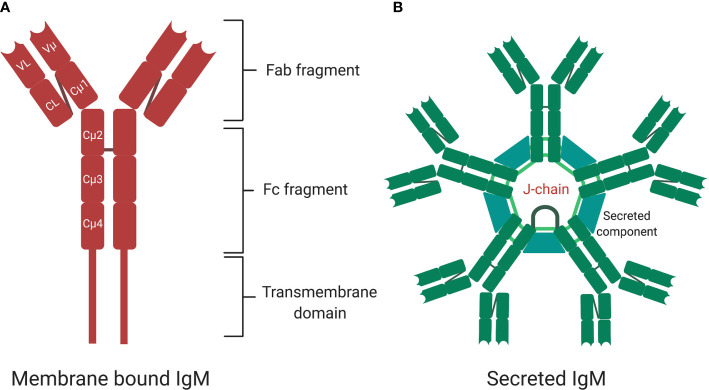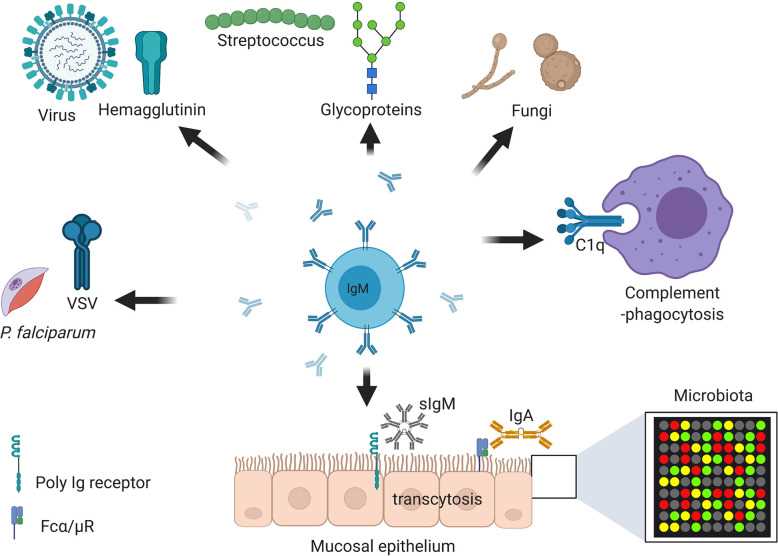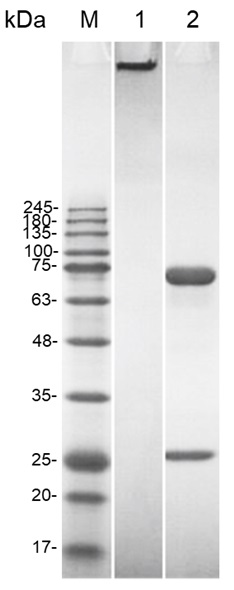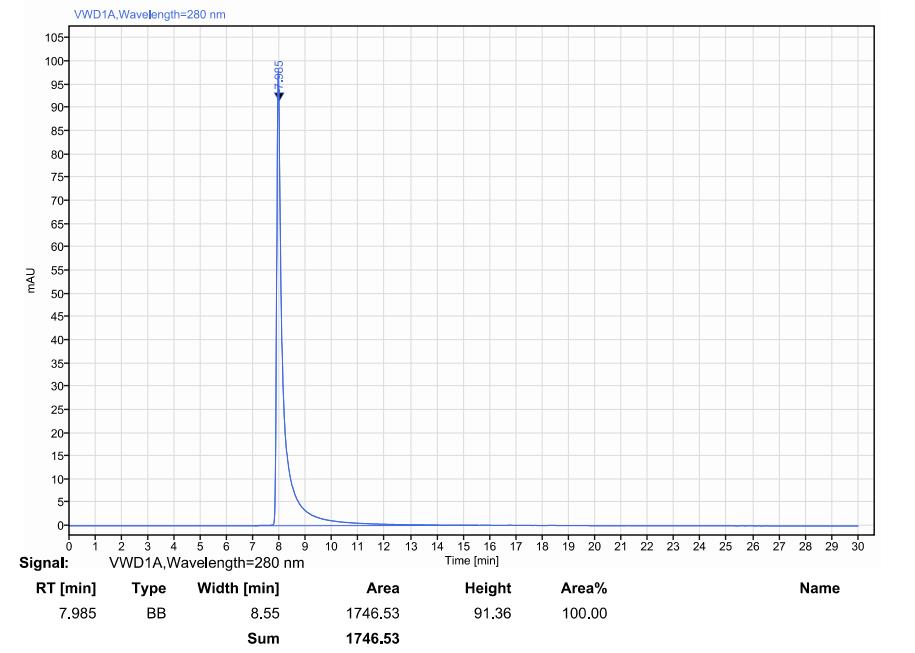IgM Antibody Products
Immunoglobulin M (IgM) is the primary natural antibody in the innate immune system, initially expressed during B cell development in response to foreign pathogens. IgM is a macro-immunoglobulin secreted in the form of pentamers or hexamers. Pentameric IgM contains 10 antigen-binding domains, while hexameric IgM contains 12, enabling efficient engagement and high avidity binding to antigens.
IgM Antibody Structure
Unlike IgG, IgM antibodies exist in various structural forms, such as monomers, pentamers (with a J chain), and hexamers (without a J chain). Monomeric IgM is a heterotetramer with a molecular weight of 180 kDa. Pentameric IgM, which is the predominant form of secreted IgM (sIgM), has a molecular weight of over 900 kDa. The assembly of pentameric IgM depends on the Joining (J) chain, a small 15 kDa glycoprotein. This pentameric structure is stabilized by disulfide bonds between the J chain and the Fc regions of IgMs. In human tissues, the J chain protects sIgM from proteases and facilitates immunoglobulin transport, providing immune protection.
 Fig. 1 The structure of membrane bound IgM (mIgM) and secreted IgM (sIgM).1, 2
Fig. 1 The structure of membrane bound IgM (mIgM) and secreted IgM (sIgM).1, 2
IgM Antibody Function
IgM has a half-life of 5 to 10 days in serum. It primarily acts as a potent activator of the classical complement pathway by binding Fc portions to C1q. A single pentameric IgM can sufficiently facilitate rapid complement activation due to its five different Fc domains. As a powerful activator of complement, IgM plays a crucial role in eradicating encapsulated bacteria, destroying pathogens, promoting inflammation, and facilitating opsonization.
 Fig. 2 Secreted IgM is essential in infections and non-communicable diseases.1, 2
Fig. 2 Secreted IgM is essential in infections and non-communicable diseases.1, 2
IgM Antibody Applications
IgM antibodies recognize various pathogenic antigens and mediate immune responses. Many diseases are associated with elevated IgM levels, IgM deficiency, or autoimmune responses mediated by IgM. These antibodies have potential applications in antibody drug discovery:
- IgM antibodies have demonstrated efficacy in various animal models.
- IgM antibodies against tumor antigens have been evaluated in clinical trials.
- The flexibility of IgM in binding multiple targets on the cell surface makes it an ideal platform for developing agonists.
- IgM-mediated autoimmunity can be utilized to ameliorate graft rejections during transplantation procedures.
IgM Antibody Production and Purification
Compared to IgG antibodies, IgMs do not bind well to protein A or G resins. IgM antibodies are sensitive to pH conditions and are soluble within narrow solubility ranges. Their large molecular size also reduces their diffusion constant relative to IgG. However, IgMs have high charge, making ion exchange (IEX) more suitable for their purification. High-purity IgM fragments can be obtained by controlling flow rates and adjusting salt concentrations. Creative Biolabs has extensive experience in IgM manufacturing and recombinant IgM expression. We offer custom IgM antibody services and products to support your drug discovery research.
 Fig. 3 SDS-PAGE analysis of purified IgM antibody.
Fig. 3 SDS-PAGE analysis of purified IgM antibody.
 Fig. 4 SEC-HPLC analysis of purified IgM antibody.
Fig. 4 SEC-HPLC analysis of purified IgM antibody.
- Jones, Katelyn, et al. "Immunoglobulin M in health and diseases: how far have we come and what next?." Frontiers in Immunology 11 (2020): 595535.
- under Open Access license CC BY 4.0, without modification.
 Loading...
Loading...-
- Species Reactivity: Human
- Type: Mouse IgM
- Application: FC, ELISA, IHC-P, IHC-fr, WB
-
- Species Reactivity: M. tuberculosis
- Type: Human IgM
- Application: ELISA, WB
- Human Anti-GRP78 Recombinant Antibody (clone SAM-6) (HPAB-0366LY)
-
- Derivation: Human
- Species Reactivity: Human
- Type: Human IgM
- Application: WB, FC, IF, Inhib, ELISA, IHC
- Human Anti-GM2 Recombinant Antibody (clone L55-81) (FAMAB-0054WJ)
-
- Species Reactivity: Human
- Type: Human IgM
- Application: WB, ELISA, Cyt, IHC
- Recombinant Human Anti-GM3 Antibody (L612) (HPAB-0190CQ)
-
- Derivation: EBV-transformed human B-cell line
- Type: Human IgM
- Application: ELISA, WB, Inhib
- Mouse Anti-ATP6AP2 Recombinant Antibody (clone 48-8) (HPAB-N0320-YC)
-
- Species Reactivity: Human, Mouse
- Type: Mouse IgM
- Application: WST-1 assay, Inhib
- Human Anti-KLH Recombinant Antibody (clone F6) (FAMAB-0074-CN)
-
- Derivation: Human
- Type: Human IgM
- Application: ELISA, FC
- Mouse Anti-Globo H Recombinant Antibody (clone MBr1) (FAMAB-0158CQ)
-
- Type: Mouse IgM, κ
- Application: FC, ICC, WB
- Anti-Human Gb3 Recombinant Antibody (3E2) (TAB-050CQ)
-
- Species Reactivity: Human
- Application: ELISA, FC
- Anti-Human MC4R Recombinant Antibody (1E8a) (TAB-0733CL)
-
- Application: ICC, IP, WB
-
- Species Reactivity: Human, Mouse, Rat
- Type: Mouse IgM
- Application: ELISA
- Mouse Anti-TNFSF8 Recombinant Antibody (clone 2E11) (VS-0224-XY130)
-
- Species Reactivity: Human
- Type: Mouse IgM
- Application: ELISA, WB
-
- Species Reactivity: Rat, Sheep
- Type: Mouse IgM
- Application: ELISA, WB, IP, IHC-P
-
- Species Reactivity: Human, Mouse, Rat
- Type: Mouse IgM
- Application: WB, FC, IF, IP, IHC-P
- Recombinant Human Anti-SARS-CoV-2 S1 Antibody (clone CS124) (VS-0923-XY23)
-
- Species Reactivity: SARS-CoV-2 (Beta variant)
- Type: Human IgM
- Application: ELISA, SPR, BLI, Neut
- Recombinant Human Anti-HIV 1 gp160 Antibody (VS-0923-FY184) (VS-0923-FY184)
-
- Species Reactivity: Human immunodeficiency virus type 1 (HIV1) group O
- Type: Human IgM
- Application: ELISA, WB
- Recombinant Human Anti-HEV ORF2c Antibody (VS-0923-FY181) (VS-0923-FY181)
-
- Species Reactivity: Hepatitis E virus (HEV)
- Type: Human IgM
- Application: ELISA, WB
- Mouse Anti-IL4 Recombinant Antibody (VS3-WK1322) (VS3-WK1322)
-
- Derivation: Mouse
- Species Reactivity: Human, Rat, Mouse
- Type: Mouse IgM
- Application: ELISA, WB
-
- Species Reactivity: Human
- Type: Mouse IgM
- Application: WB
-
- Species Reactivity: Human
- Type: Mouse IgM
- Application: WB
-
- Species Reactivity: Human
- Type: Mouse IgM
- Application: WB
-
- Species Reactivity: Human
- Type: Mouse IgM
- Application: WB
-
- Species Reactivity: Human
- Type: Mouse IgM
- Application: WB
-
- Species Reactivity: Human
- Type: Mouse IgM
- Application: WB
-
- Species Reactivity: Human
- Type: Mouse IgM
- Application: WB
-
- Species Reactivity: Human
- Type: Mouse IgM
- Application: WB
-
- Species Reactivity: Human
- Type: Mouse IgM
- Application: WB
- Mouse Anti-TYR Recombinant Antibody (VS3-CJ655) (VS3-CJ655)
-
- Species Reactivity: Human
- Type: Mouse IgM
- Application: IHC
-
- Species Reactivity: Human
- Type: Mouse IgM, κ
- Application: WB, IHC-P
-
- Derivation: Mouse
- Species Reactivity: Human
- Type: Mouse IgM
- Application: WB
-
- Derivation: Mouse
- Species Reactivity: Human
- Type: Mouse IgM
- Application: WB
-
- Derivation: Mouse
- Species Reactivity: Human
- Type: Mouse IgM
- Application: WB
-
- Derivation: Mouse
- Species Reactivity: Human
- Type: Mouse IgM
- Application: WB
-
- Derivation: Mouse
- Species Reactivity: Human
- Type: Mouse IgM
- Application: WB
-
- Derivation: Mouse
- Species Reactivity: Human, Mouse
- Type: Mouse IgM
- Application: WB
-
- Derivation: Mouse
- Species Reactivity: Human
- Type: Mouse IgM
- Application: WB
-
- Derivation: Mouse
- Species Reactivity: Human
- Type: Mouse IgM
- Application: WB, ICC, FC
-
- Derivation: Mouse
- Species Reactivity: Rat
- Type: Mouse IgM
- Application: WB
-
- Derivation: Mouse
- Species Reactivity: Human
- Type: Mouse IgM
- Application: WB
-
- Derivation: Mouse
- Species Reactivity: Human
- Type: Mouse IgM
- Application: WB
-
- Derivation: Mouse
- Species Reactivity: Human
- Type: Mouse IgM
- Application: WB
-
- Derivation: Mouse
- Species Reactivity: Human
- Type: Mouse IgM, κ
- Application: WB
-
- Derivation: Mouse
- Species Reactivity: Human
- Type: Mouse IgM
- Application: WB
-
- Derivation: Mouse
- Species Reactivity: Human
- Type: Mouse IgM
- Application: WB, ICC
-
- Derivation: Mouse
- Species Reactivity: Human
- Type: Mouse IgM
- Application: WB
-
- Derivation: Mouse
- Species Reactivity: Human
- Type: Mouse IgM
- Application: WB
-
- Derivation: Mouse
- Species Reactivity: Human
- Type: Mouse IgM
- Application: WB
-
- Derivation: Mouse
- Species Reactivity: Human
- Type: Mouse IgM
- Application: WB
-
- Derivation: Mouse
- Species Reactivity: Human
- Type: Mouse IgM
- Application: WB
-
- Derivation: Mouse
- Species Reactivity: Human
- Type: Mouse IgM
- Application: WB
-
- Derivation: Mouse
- Species Reactivity: Human, Mouse
- Type: Mouse IgM
- Application: WB, ICC
-
- Derivation: Mouse
- Species Reactivity: Human
- Type: Mouse IgM
- Application: WB
-
- Derivation: Mouse
- Species Reactivity: Human
- Type: Mouse IgM, κ
- Application: WB
-
- Derivation: Mouse
- Species Reactivity: Human
- Type: Mouse IgM
- Application: WB
-
- Derivation: Mouse
- Species Reactivity: Human
- Type: Mouse IgM
- Application: WB
-
- Derivation: Mouse
- Species Reactivity: Human
- Type: Mouse IgM
- Application: WB
-
- Derivation: Mouse
- Species Reactivity: Human, Mouse, Monkey, Rat
- Type: Mouse IgM
- Application: WB, ICC
-
- Derivation: Mouse
- Species Reactivity: Human
- Type: Mouse IgM
- Application: WB
-
- Derivation: Mouse
- Species Reactivity: Human
- Type: Mouse IgM
- Application: WB
-
- Derivation: Mouse
- Species Reactivity: Human, Mouse
- Type: Mouse IgM
- Application: WB
-
- Derivation: Mouse
- Species Reactivity: Human
- Type: Mouse IgM
- Application: WB
-
- Species Reactivity: Human
- Type: Mouse IgM, κ
- Application: FuncS
-
- Species Reactivity: Human
- Type: Mouse IgM, κ
- Application: FC, IF
-
- Type: Mouse IgM, κ
- Application: ICC, IF, WB
-
- Species Reactivity: Human
- Type: Human IgM, λ
- Application: FC, ICC, IP, WB
-
- Species Reactivity: Human
- Type: Human IgM, λ
- Application: FuncS
-
- Species Reactivity: Human
- Type: Mouse IgM, κ
- Application: ICC, IF, WB
-
- Species Reactivity: Human
- Type: Mouse IgM, λ
- Application: ICC, IF, WB
-
- Species Reactivity: Human
- Type: Mouse IgM, κ
- Application: IHC, WB
-
- Species Reactivity: C.jejuni
- Type: Mouse IgM
- Application: ELISA, IF
-
- Species Reactivity: Rat
- Type: Mouse IgM
- Application: IF, ICC, WB, IP
-
- Species Reactivity: G. lamblia
- Type: Mouse IgM
- Application: IF
-
- Species Reactivity: SARS-CoV-2
- Type: Human IgM
- Application: ELISA, Neut
-
- Species Reactivity: All
- Type: Mouse IgM
- Application: ELISA
-
- Species Reactivity: Dog, Cat, Caprine, Hamster, Human, Monkey, Mouse, Rabbit, Rat, Xenopus, Zebrafish
- Type: Mouse IgM
- Application: IHC-Fr, IHC-P, WB
-
- Species Reactivity: Human, Zebrafish
- Type: Mouse IgM
- Application: FC
-
- Species Reactivity: Human, Zebrafish
- Type: Mouse IgM
- Application: FC, ICC
- Rat Anti-Gbgt1 Antibody (clone 117C9) (ZG-0952F)
-
- Species Reactivity: Mouse
- Type: Rat IgM
- Application: IHC-Fr
-
- Species Reactivity: Human
- Type: Mouse IgM
- Application: ELISA, IRMA, IHC
-
- Species Reactivity: Human
- Type: Mouse IgM
- Application: Direct IF, IF, FC
- Anti-Rat CD3 (FITC)/CD8 (RPE) Antibody Cooktail (MRO-A1965-YJ)
-
- Species Reactivity: Rat
- Type: IgM, IgG1
- Application: FC
- Anti-Rat CD3 (FITC)/CD45RA (RPE) Antibody Cooktail (MRO-A1963-YJ)
-
- Species Reactivity: Rat
- Type: IgM, IgG1
- Application: FC
- Anti-Rat CD3 (FITC)/CD4 (RPE) Antibody Cooktail (MRO-A1961-YJ)
-
- Species Reactivity: Rat
- Type: IgM, IgG1
- Application: FC
- Mouse Anti-FK-506 Recombinant Antibody (clone CBS385) (MRO-A1917-YJ)
-
- Type: Mouse IgM
- Application: WB, ELISA
-
- Type: Mouse IgM
- Application: ELISA
- Mouse Anti-Enrofloxacin Recombinant Antibody (clone CBS371) (MRO-A1850-YJ)
-
- Species Reactivity: Other
- Type: Mouse IgM
- Application: ELISA
- Monkey IgM Isotype control, Polyclonal (MRO-A1594-YJ)
-
- Type: Monkey IgM
- Application: Control
- Mouse Anti-DNA Recombinant Antibody (clone ET844.3.1) (MOR-A1364-YJ)
-
- Species Reactivity: Many
- Type: Mouse IgM
- Application: ELISA
- Human Anti-ZIKV NS1 Recombinant Antibody (clone FC3) (FAMAB-0756WJ)
-
- Species Reactivity: ZIKV
- Type: Human IgM, κ
- Application: ELISA, WB, Neut
- Human Anti-Self antigens Recombinant Antibody (clone BY-4) (FAMAB-0676WJ)
-
- Species Reactivity: Human
- Type: Human IgM
- Application: ELISA, WB
- Mouse Anti-MPO Recombinant Antibody (clone 6D6) (FAMAB-0622WJ)
-
- Derivation: Hybridoma
- Species Reactivity: Human
- Type: Mouse IgM, κ
- Application: ELISA, WB, IF
- Mouse Anti-EBNA-1 Recombinant Antibody (clone 16D2) (FAMAB-0524WJ)
-
- Derivation: Hybridoma
- Species Reactivity: EBV
- Type: Mouse IgM, κ
- Application: ELISA, WB, IF
- Human Anti-Cardiolipin Recombinant Antibody (clone RSP4) (FAMAB-0458WJ)
-
- Species Reactivity: Human
- Type: Human IgM, λ
- Application: ELISA, WB
-
- Derivation: Hybridoma
- Species Reactivity: B. anthracis
- Type: Mouse IgM
- Application: ELISA, WB
-
- Derivation: Chimeric (mouse/human)
- Species Reactivity: MeV
- Type: Chimeric (mouse/human) IgM
- Application: ELISA, WB
-
- Species Reactivity: S. pneumoniae
- Type: Human IgM, κ
- Application: ELISA, WB, Neut
- Mouse Anti-ONE Recombinant Antibody (clone 1F3) (FAMAB-0268WJ)
-
- Derivation: Hybridoma
- Type: Mouse IgM
- Application: ELISA, WB
- Human Anti-LAIR1 Recombinant Antibody (clone MGF21) (FAMAB-0230WJ)
-
- Species Reactivity: Human
- Type: Human IgM
- Application: ELISA, WB
- Human Anti-IAV HA Recombinant Antibody (clone 16D11) (FAMAB-0219WJ)
-
- Derivation: Hybridoma
- Species Reactivity: IAV
- Type: Human IgM
- Application: ELISA, WB, Neut
- Mouse Anti-HPV16 E7 Recombinant Antibody (clone 79A11) (FAMAB-0192WJ)
-
- Derivation: Hybridoma
- Species Reactivity: HPV16
- Type: Mouse IgM
- Application: ICC, IF, IHC, ELISA, WB, Neut
Our customer service representatives are available 24 hours a day, from Monday to Sunday. Contact Us
Can't find the products you're looking for? Try to filter in the left sidebar.Filter By Tag
For Research Use Only. Not For Clinical Use.

